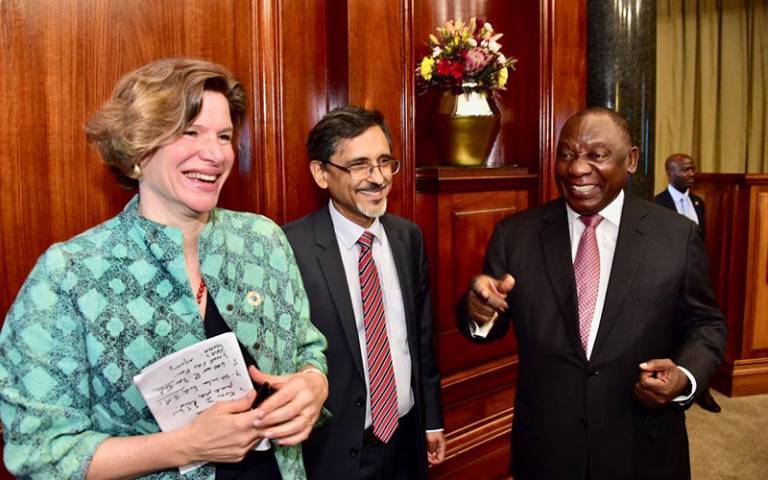Tackling economic inequality with the Open Society Foundations and UCL
The Open Society Foundations are supporting UCL’s Institute for Innovation and Public Purpose to expand its reach and tackle society’s big challenges.

8 July 2022
Image: IIPP Director Professor Mariana Mazzucato at the Presidential Economic Advisory Council (PEAC) meeting in Pretoria, where she presented mission-oriented innovation and industrial strategy to the entire South African cabinet. (April, 2020)
A world where economies are fairer and human rights are integral to all governments’ policies is often dismissed as a pipedream. But for the Open Society Foundations (OSF), this vision of the future isn’t idealistic, it’s the goal.
To encourage balanced and inclusive democracies across the world, OSF provides crucial funding to innovative, cutting-edge partners whose work pushes the global narrative forward – and one such organisation is the University College London (UCL) Institute for Innovation and Public Purpose (IIPP).
Building an invaluable relationship
IIPP is an academic department that takes theory and policy practice equally seriously. It was set up in 2017 to rethink public policy, and the state to build the public-private partnerships required to tackle today’s moonshots. This requires public organisations to change how public value is imagined, practised and evaluated both internally and between organisations. While OSF already had a wider association with IIPP, it was a conversation between Professor Mariana Mazzucato, Founding Director of the IIPP, and the previous President of OSF, Patrick Gaspard, that started a unique new phase of the relationship. The OSF had also been funding the work of Professor Mazzucato on health innovation since 2017.

Sofia Hurtado Epstein, Program Manager at OSF
Sofia Hurtado Epstein, Program Manager, Fiscal Justice Global Programs at OSF, explains: “One of the things the OSF has realised is that if you want to work on – and strengthen – democracy, then economic and social rights are essential. IIPP is convinced this requires rethinking the state and the role of policy in modern capitalism making away from market fixing, towards market shaping.
“We're seeing a world with rising inequality, broken financial systems, increased corporate concentration, challenges like climate change, and we need to tackle all of these issues. From that conversation, it was clear that the way IIPP was addressing these things was something fresh and in line with our priorities. Our relationship was a no-brainer.”
A partnership towards shared goals
In 2020, OSF and IIPP announced a three-year strategic partnership with an institutional grant of $3 million – a flexible, long-term grant that would allow IIPP to focus on its overall priorities rather than specific outcomes. Sofia was involved in establishing the metrics of the grant and she’s been impressed by the work of the IIPP so far.
“IIPP is a unique organisation,” she says. “Its nature as a think-and-do tank goes beyond what a traditional academic department does, and its emphasis on working directly with – and training – government agencies is very impactful. Its notion of public value over market value is the key to writing new economic rules. It’s allowing us to think of a different system and take a different look at economic relationships.”
A global approach to change
The team at OSF firmly believes that building a more democratic future cannot be done from just one location. That’s why they work with more than 120 countries. Sofia says: “The fact that UCL is a global university, and that IIPP is doing global work, is fundamental.”
This international view of inequality powers IIPP to bring fresh ideas to spark meaningful social change and allows it to leverage approaches that are successful in one region and apply them in another. Sofia continues: “UCL connects the core functions of a university to the real world. They’ve expanded their geographical footprint with work in Latin America and Africa. This clear action is incredibly attractive to funders.”
UCL and the IIPP have built the ‘Studio Lab’ (a policy lab funded by Laudes Foundation) to help them prototype the unique methodology used to work with global organisations through practice based theorising.
IIPP Director Professor Mariana Mazzucato says: “IIPP believes that inequality must be tackled in a predistributive way, not just redistributive. This means getting the right relationships between public and private sectors, and between capital and labour from the beginning. Our work helps to inform how to build symbiotic rather than parasitic eco-systems in health, in digital and in the green economy. We work with governments globally to redesign tools with this outcomes oriented perspective.”
Professor Mazzucato was appointed to the South African Economic Advisory Council in 2019 and has since helped to ensure consistency within the implementation of economic policy while supporting the government’s commitment to economic reform.
For the future
The tight alignment between IIPP and OSF is clear. And looking to the future, the team at OSF is excited about the potential power of the relationship. In its plans, and with the support of the OSF grant, IIPP is looking to develop a global executive leadership programme, expand its work in the Global South and deepen its work on climate justice, health innovation and the future of work.
Sofia says: “Supporting IIPP is a way for us to be part of their powerful conversation, and it influences the way we think about the issues on our agenda and how we have conversations with other grantees. It's also inspiring for other grantees and partners to see that these ideas are out there, and there are options that go beyond long-standing economic structures.”
 Close
Close

